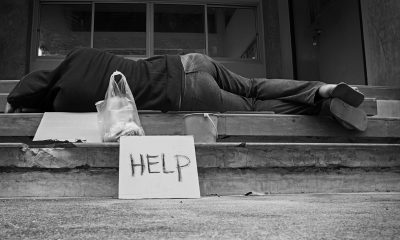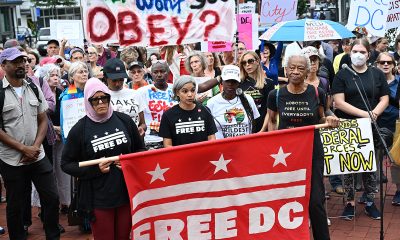National
Meet the new faces of LGBT juvenile corrections
DOJ, municipalities and former inmates are working to save gay youth
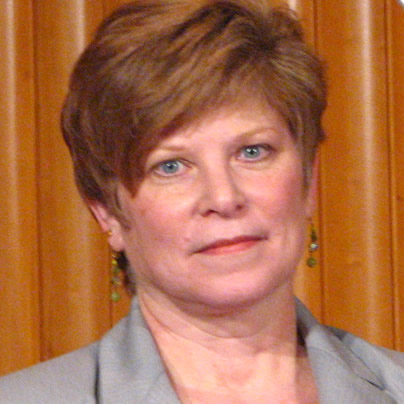
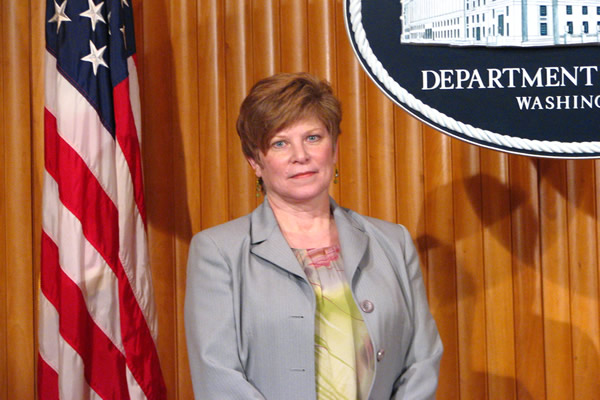
Lorie Brisbin, a program specialist with the Department of Justice, said many LGBT juveniles in custody are there for survival crimes. (Photo courtesy of DOJ)
By THOM SENZEE
LGBT youth have enough trouble adjusting to life in what is still, for lack of a better term, “a straight man’s world.” But for LGBT youth in custody, the world is often a supremely frightening place.
“There is a significant portion of LGBTI juveniles in custody who are there for what we can call survival crimes,” explains Lorie Brisbin, a program specialist with the Department of Justice’s Office of Juvenile Justice and Delinquency Prevention (OJJDP).
“In many cases, these are kids who have been kicked out of their homes by their families simply because of their particular orientation, be that lesbian, gay or what have you.”
Made homeless by their parents as adolescents or as teenagers, and forced to face a tough world on their own with no basic tools for living—such as work experience or identification cards—some LGBT youth turn to petty crimes in order to survive. Survival crimes range from stealing food from grocery stores to prostitution and burglary.
In fact, merely being a homeless minor after 10 p.m. amounts to a violation of curfew laws, not to mention truancy if they cannot stay in school after becoming homeless.
Of course, some homeless youth turn to more serious crimes. Regardless of how they end up in custody, LGBT juveniles find themselves in a system that is only now beginning to recognize that there is a difference in needs compared to their heterosexual counterparts that corrections officials must know in order to keep them safe and well.
“Corrections is a very closed system,” Brisbin said. “There is a lot of education that needs to go on in helping staff feel comfortable with certain issues.”
Two specific issues that could be considered the meat and potatoes of the over-arching problem of how to safely and healthfully manage LGBT juvenile inmates are isolation and gender-appropriate placement.
Getting those two issues right, according to experts, builds a foundation where both juveniles in custody and corrections staff are safer than they would be otherwise.
“For instance, if you have a gay male who is not willing to hide who he is—and most are more than willing to hide—the way it used to work, staff were traditionally going to isolate you for your own protection,” explained Laura Garnette, deputy chief probation officer at Santa Clara County, Calif. Juvenile Detention Division.
“But the courts have said that’s unconstitutional. And actually I say to them, corrections staff, that’s your job. It’s not the juvenile’s job to keep himself safe; that’s what you’re getting paid to do. You’re making them do your job by putting them in isolation.”
According to OJJDP’s Brisbin, Garnette’s employer is a model of safety, efficacy and ethical management of LGBT and intersex juveniles in custody.
“Santa Clara County is phenomenal,” Brisbin told the Washington Blade. “It starts with their perspective, looking at their policies and making their environment safer and more welcoming.”
“More welcoming” might sound like an odd phrase to use when talking about incarceration. But it is important to remember, according to Brisbin, as well as Deputy Chief Probation Officer Garnette and other corrections professionals the Blade spoke to in researching this story; juvenile detention is mandated to rehabilitate rather than simply punish, as is often the case in adult corrections systems.
“Santa Clara probation has worked hard to redefine juvenile corrections,” said Brisbin, speaking by phone from her office at the Department of Justice in Washington, D.C. “Now, when a youthful offender who is lesbian, gay, bisexual, transgender or intersex comes in, they are processed much differently, providing the best possible outcome for the general population and the staff.”
But it is not necessarily easy to bring change to the corrections establishment.
“You want to watch something entertaining, just tell a group of unenlightened corrections workers that they need to put a male-to-female transgender offender into housing with girls,” Santa Clara County’s Garnette said. “You’d think you had just told them the most hilarious or outlandish thing anyone ever said.”
Nowadays all youthful offenders in Santa Clara County are processed into and counseled within custody in a manner that is both neutral in terms of sexual orientation and gender identity.
“For instance, I might ask a male inmate if he has a girlfriend or if he has a boyfriend,” explains Garnette. “He might respond, ‘why would you ask me if I have a boyfriend; what do you think I am a fucking faggot?’”
“And then, of course, I respond, ‘well, why wouldn’t I ask? You could have either. How would I know which? There are plenty of gay young men who don’t fit stereotypes.’”
According to Garnette, that response safely opens the door for an honest answer if the youth is gay, while also planting a seed of tolerance if he is straight.
Santa Clara County neither isolates LGBT juvenile inmates individually, nor places them together in separate groups. Instead, officials and detention staff work with vigilance by observing and counseling all inmates to prevent physical altercations and eliminate bullying in real time—on the floors of housing units in its detention centers, 24/7.
“Isolation is not the solution,” Garnette said. “It’s our job to keep these kids safe by using our words, our eyes and our ears. Yes, it’s hard work, but simply isolating them is lazy and injurious. If you can’t do the job of keeping gay kids safe in the general population, then I’m sorry; get a different job.”
According to OJJDP’s Brisbin, a new vigor arrived in the juvenile corrections profession when, in 2012, the Justice Department issued national standards for ensuring that detention facilities conform to the 2003, “Prison Rape Elimination Act” (PREA) for the first time.
Among a litany of guidelines announced by Attorney General Eric Holder was a mandate to “incorporate unique vulnerabilities of lesbian, gay, bisexual, transgender, intersex and gender nonconforming inmates into training and screening protocols.”
Brisbin organizes workshops for corrections officials and juvenile detention facilities workers around the nation. Her training sessions are designed to introduce technical tools to help realize the promise of PREA, which is an end to rape and sexual abuse behind bars.
“For example PREA calls for changes in language that has been used in facilities in the past,” Brisbin said. “We talk about respectful communications—how do you do it and still get the kind of behavior you need for conformity in a locked-down situation.”
According to her, the words once used recklessly by officials at juvenile lockdowns can actually incite abuse.
“But words can also help prevent violence,” she said. “If you have a verbally disrespectful environment, that can be very, very unsafe. Don’t use terms that are inherently offensive. For instance, it used to be respectful to use the term hermaphrodite; that’s no longer seen as acceptable to use.”
Transgender and intersex youth in custody face particularly tough circumstances finding their places in detention settings. However well intentioned, detention-facility staff with varying levels of education can find the task of helping transgender, questioning and intersex youth safely fit in at “juvie” quite daunting.
Consider the latter of those three categories of youth: The Intersex Society of North America says the complexity of intersexuality makes it a subjective issue—albeit with real biological (i.e., chromosomal and genitalia-related) aspects.
“[Intersexuality] is a socially constructed category that reflects real biological variation,” reads the introductory statement on the group’s homepage. “To better explain this, we can liken the sex spectrum to the color spectrum. There’s no question that in nature there are different wavelengths that translate into colors most of us see as red, blue, orange, yellow. But the decision to distinguish, say, between orange and red-orange is made only when we need it—like when we’re asking for a particular paint color…”
When even experts and advocates admit that making gender distinctions among intersex persons can be similar to knowing the difference between burnt-orange and maroon-rust, how is a juvenile hall counselor working the graveyard shift in a Midwest suburb supposed to know how to refer to an intersex juvenile inmate?
The answer, according both Brisbin and Garnette, is surprisingly simple—let the individual inmate decide. They say the same rule applies to transgender youth in custody.
“The very worst thing you can do is call a transgender girl ‘he’ or ‘him,’” she said. “Not only can that lead to violence from other inmates, which puts the staff in danger as well as the kids in the facility, but it’s emotionally violent. It does real harm.”
Garnette, who is a lesbian, entered the corrections field at the end of the 1980s.
“It was about as different then compared to today as you can imagine,” she said. “This is an exciting time to be working in this field. In the past 10 years we have seen a change to evidence-based policies and procedures that wasn’t there before.”
According to Garnette, there was a time in her early career when she had bosses whose approaches to juvenile corrections were strictly tough for sake of toughness, or more permissive simply for the sake of permissiveness.
“Either way, it wasn’t about using research for evidence-based outcomes,” she said. “Now it’s exactly the opposite; that’s just what we do.”
Ten years ago it might have been impossible for Mark Seymour, a former inmate who served time in prison for a drug offense, to work with leading practitioners and researchers in the juvenile corrections field.
“When I got out of prison in 2010, I knew I wanted to do something to make it better for LGBT youth in custody because I know first-hand how bad things like being put in isolation—just because you happen to be gay—can be,” Seymour told the Blade. “It took everything I had within me to not lose my mind in isolation.”
Seymour is the first fellow at the National Center for Youth in Custody. He is currently helping implement a pilot program to disseminate the fast-growing body of evidence-based knowledge about how to better meet the stated missions of juvenile corrections facilities: rehabilitating youthful offenders.
“The exciting thing is that a big part of this new push to bring scholarship, research and practical knowledge about what works is a focus on LGBTI kids,” explains Seymour. “The youth of our community, for the first time, are part of the conversation.”
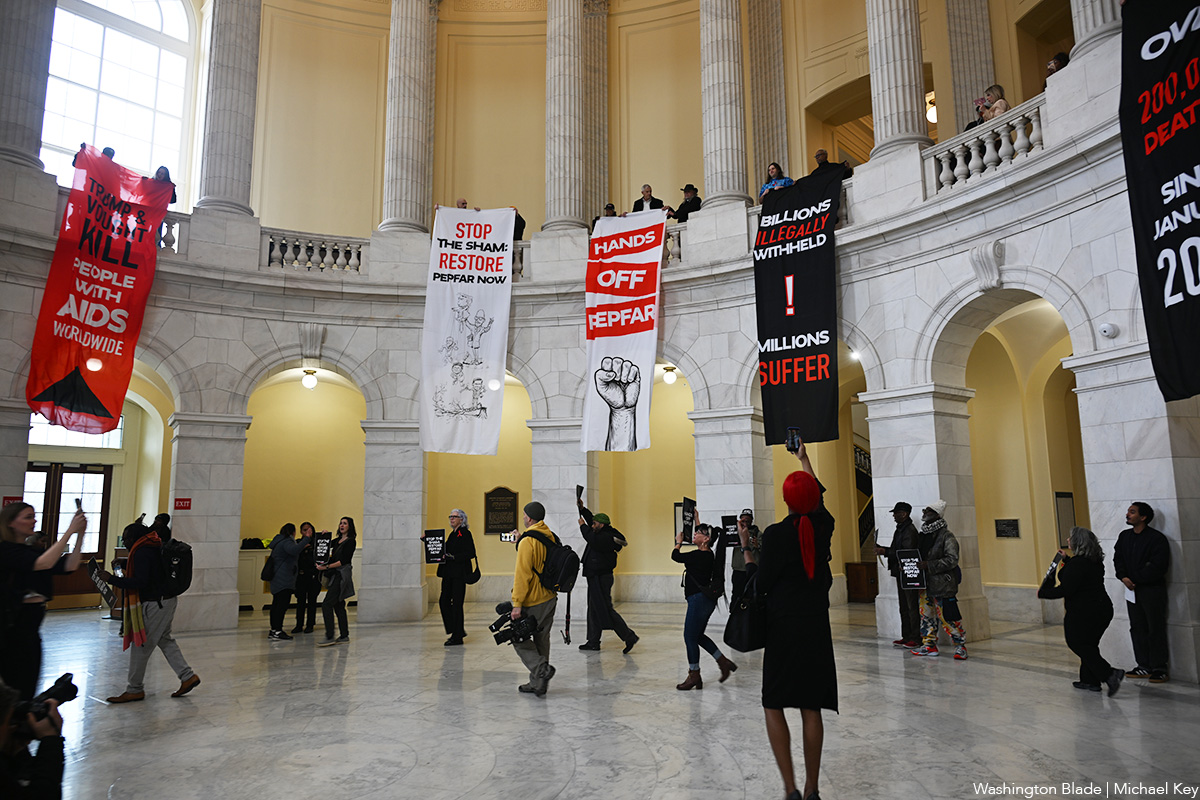
U.S. Capitol Police on Thursday arrested 13 HIV/AIDS activists in the Cannon House Office Building Rotunda.
The activists — members of Housing Works, Health GAP, and the Treatment Action Group — joined former PEPFAR staffers in demanding full funding of the program that President George W. Bush created in 2003. They chanted “AIDS cuts kill, PEPFAR now!” and unfurled banners from the Rotunda’s second floor that read “Trump and (Office of Management and Budget Director Russell) Vought kill people with AIDS worldwide,” “Over 200,000 deaths since January 2025,” and “Hands off PEPFAR” before their arrest.
(Washington Blade video by Michael K. Lavers)
This protest is the latest against the Trump-Vance administration’s HIV/AIDS policies since it took office.
Secretary of State Marco Rubio on Jan. 28, 2025, issued a waiver that allowed PEPFAR and other “life-saving humanitarian assistance” programs to continue to operate during a freeze on nearly all U.S. foreign aid spending. HIV/AIDS service providers around the world with whom the Washington Blade has spoken say PEPFAR cuts and the loss of funding from the U.S. Agency for International Development, which officially closed on July 1, 2025, has severely impacted their work.
The State Department last September announced PEPFAR will distribute lenacapavir in countries with high prevalence rates. Zambia is among the nations in which the breakthrough HIV prevention drug has arrived.
The New York Times last summer reported Vought “apportioned” only $2.9 billion of $6 billion that Congress set aside for PEPFAR for fiscal year 2025. (PEPFAR in the coming fiscal year will use funds allocated in fiscal year 2024.)
Bipartisan opposition in the U.S. Senate prompted the Trump-Vance administration last July withdraw a proposal to cut $400 million from PEPFAR’s budget. Vought on Aug. 29, 2025, said he would use a “pocket rescission” to cancel $4.9 billion for HIV/AIDS prevention and global health programs and other foreign aid assistance initiatives that Congress had already approved.
The White House in January announced an expansion of the global gag rule to ban U.S. foreign aid for groups that promote “gender ideology.” President Ronald Reagan in 1985 implemented the original regulation, also known as the “Mexico City” policy, which bans U.S. foreign aid for groups that support abortion and/or offer abortion-related services. The Council for Global Equality and other groups say the expanded rule will adversely impact HIV prevention efforts around the world.
A press release that Housing Works and Health GAP issued on Thursday notes more than $977 million “in appropriated PEPFAR funding for HIV prevention and treatment was unspent by the end of fiscal year (FY) 2025 — triple amount unspent at the end of FY 2024.”
“Activists predict this backlog will worsen rapidly in FY 2026 unless Congress immediately reasserts its Constitutionally-mandated oversight authority,” notes the press release.
The press release also indicates funding for the Centers for Disease Control and Prevention’s PEPFAR programs “will run out” by April 1 because “only 45 percent of their FY26 funding has been transferred from the State Department.
“Unless funding is transferred immediately, CDC’s global HIV programs across sub-Saharan Africa, Asia and the Caribbean will grind to a halt,” notes the press release.
The activists demanded Trump, Vought, Rubio, and Congress do the following:
- Activists are calling for full obligation of appropriated PEPFAR funds and rejection of growing political interference in global and domestic HIV programs
- Immediately release already-appropriated, unobligated PEPFAR funds
- Break the blackout on PEPFAR data, so Congress and people with HIV know how funding is being spent and can program based on data
- Activists are calling for full obligation of appropriated PEPFAR funds and rejection of growing political interference in global and domestic HIV programs.
“PEPFAR has saved more than 26 million lives and changed the trajectory of an epidemic,” said Housing Works CEO Charles King. “However, the Trump administration’s decision, over the objection of Republicans in Congress, to freeze PEPFAR funding has caused decades of progress to come undone and has been a death sentence for people with HIV relying on life-saving treatment. The U.S. must immediately restore PEPFAR funding and regain our standing in the global fight against HIV.”
King is among the activists who were arrested.
(Washington Blade video by Michael K. Lavers)

Texas state Rep. James Talarico won a hard-fought primary Tuesday to become the state’s Democratic nominee for U.S. Senate, defeating U.S. Rep. Jasmine Crockett in one of the year’s most closely watched and competitive Democratic contests.
Talarico, a Presbyterian seminarian and three-term lawmaker from Round Rock, was declared the winner by the Associated Press early Wednesday morning after a closely tracked vote count that drew national attention.
“Tonight, the people of our state gave this country a little bit of hope,” Talarico told the AP. “And a little bit of hope is a dangerous thing.”
With 52.8% of the vote to Crockett’s 45.9%, Talarico secured the nomination outright, avoiding a runoff and capping months of sharp contrasts between the two candidates over strategy, messaging, and how best to compete statewide in Texas. Democrats hope the competitive primary — and the relatively narrow margin — signals growing momentum in a state that has not elected a Democrat to the U.S. Senate since 1988.
Talarico has long expressed support for the LGBTQ community, a position he highlights prominently on his campaign website. Under the “Issues” section, he directly addresses assumptions that might arise from his faith and background as a seminarian in a deeply conservative state.
“My faith in Jesus leads me to reject Christian Nationalism and commit myself to the project of democracy,” his website reads. “Because that’s the promise of America: a democracy where every person and every family — regardless of religion, race, gender, sexual orientation, or any other difference between us — can truly be free and live up to their full potential.”
Crockett struck a conciliatory tone following her defeat, emphasizing party unity ahead of November.
“This morning I called James and congratulated him on becoming the Senate nominee,” Crockett told Politico. “Texas is primed to turn blue and we must remain united because this is bigger than any one person. This is about the future of all 30 million Texans and getting America back on track.”
Talarico also drew national attention earlier in the race when “Late Show” host Stephen Colbert said he was initially unable to air an interview with the state legislator due to potential FCC concerns involving CBS. The episode sparked a broader political debate.
Brendan Carr, chair of the Federal Communications Commission, appointed by President Donald Trump, told reporters the controversy was a “hoax,” though he also acknowledged Talarico’s ability to harness the moment to build support as an underdog candidate. The interview was later released online and garnered millions of views, boosting Talarico’s national profile.
In November, Talarico will face the winner of the Republican primary between incumbent Sen. John Cornyn and Texas Attorney General Ken Paxton, who have been locked in a bruising GOP contest. Rep. Wesley Hunt was also in the Republican primary field. The GOP race is expected to head to a May runoff.
In a joint statement, Senate Minority Leader Chuck Schumer and Democratic Senatorial Campaign Committee Chair Kirsten Gillibrand praised Talarico’s victory and framed him as a candidate capable of broad appeal.
“As an eighth-generation Texan, former middle school teacher, and Presbyterian seminarian, James will be a fighter for Texans from all walks of life and of all political stripes,” they said. “In November, Texans will elect a champion for working people: James Talarico.”
National
Peter Thiel’s expanding power — and his overlap with Jeffrey Epstein
Gay billionaire’s name appears 2,200 times in files, but no criminality alleged

There are few figures in modern politics whose reach extends across Silicon Valley, Wall Street, and Washington, D.C., as Peter Thiel’s.
A billionaire venture capitalist, Thiel built his fortune at the dawn of the internet age and has since positioned himself at the highest levels of U.S. technology, finance, and national defense infrastructure. He is best known as a co-founder of PayPal, an early investor in Facebook, and the co-founder of Palantir Technologies — a data analytics firm that maintains significant contracts with U.S., U.K., and Israeli defense and intelligence agencies.
Over the last two decades, Thiel has also built an interconnected network of investment vehicles — Clarium Capital, Founders Fund, Thiel Capital, Valar Ventures, and Mithril Capital — giving him influence over emerging technologies, political candidates, and ideological movements aligned with his worldview. Through these firms, Thiel has backed companies in artificial intelligence, defense technology, biotech, cryptocurrency, and financial services, often positioning himself early in sectors that later became central to public policy debates.
Born in Frankfurt, West Germany, in 1967, Thiel immigrated to the United States as an infant. He later attended Stanford University, earning a degree in philosophy before graduating from Stanford Law School in 1992. As an undergraduate, he founded The Stanford Review, a conservative student publication that opposed what it described as campus “political correctness.” The paper became a platform for combative and contrarian arguments that previewed themes Thiel would revisit in later essays and speeches about elite institutions, democracy, and technological stagnation.
Thiel’s professional ascent coincided with the explosive growth of the dot-com era. In 1998, he co-founded PayPal, helping pioneer digital payment systems that would become foundational to online commerce. When the company was sold to eBay in 2002 for $1.5 billion, Thiel emerged a multimillionaire and part of what would later be known as the “PayPal Mafia” — a loose but influential network of founders and early employees who went on to launch or invest in some of Silicon Valley’s most dominant firms.
In 2004, Thiel made one of the most consequential investments of his career, providing $500,000 in seed funding to Facebook, then a fledgling social network founded by Mark Zuckerberg. He became the company’s first outside investor and later served on its board. That early bet proved extraordinarily lucrative and cemented Thiel’s status as a major venture capitalist with a reputation for identifying transformative platforms before they reached scale.
The same year, he co-founded Palantir Technologies. Initially backed in part by In-Q-Tel, the CIA’s venture capital arm, Palantir developed software — including its Gotham platform — designed to help defense, intelligence, and law enforcement agencies integrate and analyze massive datasets. The company’s tools allow users to map relationships, identify patterns, and visualize complex networks across financial records, communications data, and other digital trails.
Over time, Palantir secured billions of dollars in public-sector contracts. It has worked with the U.S. Department of Defense, Immigration and Customs Enforcement, the Centers for Disease Control and Prevention, and allied governments abroad. Public reporting has documented that its global government contracts exceed $1.9 billion, including agreements with Israeli defense entities — relationships that reportedly expanded following the Oct. 7 attacks in Israel. Critics have raised concerns about civil liberties and surveillance, while supporters argue the company provides essential national security tools.
By the mid-2000s, Thiel was no longer simply a wealthy entrepreneur. He was a financier operating at the intersection of capital, advanced technology, and government — with investments embedded in some of the country’s most sensitive security systems. His political giving would later extend that influence further, including support for candidates aligned with his populist and nationalist leanings– notably Donald Trump in 2016.
As his wealth and influence expanded, so too did his proximity to other powerful — and, in some cases, controversial — figures in global finance.
Among them was Jeffrey Epstein.
Thiel’s name appears more than 2,200 times in documents released so far by the U.S. Department of Justice related to Epstein. A name appearing in legal filings does not, by itself, indicate wrongdoing. However, the extensive references illustrate that Epstein’s social and financial network intersected with elite figures in technology, academia, politics, and finance — including individuals connected to Thiel’s business and philanthropic circles.
Epstein’s legal troubles became public in 2005, when police in Palm Beach, Fla., investigated allegations that he had sexually abused a minor. In 2008, he pleaded guilty in state court to soliciting prostitution from a minor under a plea agreement that was widely criticized as unusually lenient. He served 13 months in county jail with work-release privileges and was required to register as a sex offender. Comparable federal charges can carry significantly longer sentences.
Despite that conviction, Epstein continued to maintain relationships with prominent business and political figures for years. The extent to which members of elite networks remained in contact with him after his guilty plea has been the subject of extensive scrutiny.
Documents released by the Justice Department indicate that individuals connected to Thiel’s philanthropic and investment circles communicated with Epstein after his conviction. One document shows an invitation, sent on behalf of the Thiel Foundation, for Epstein to attend a technology event in San Francisco. Additional financial records and reporting indicate that between 2015 and 2016, Epstein invested approximately $40 million in funds managed by Valar Ventures, one of Thiel’s firms. Other records reflect meetings and correspondence, at times arranged through intermediaries. Epstein also extended invitations to his Caribbean residence.
There is no evidence that Thiel was involved in Epstein’s criminal conduct. The documented interactions do, however, show numerous planned meetings between the two both in the Caribbean (where Epstein’s infamous island is located) and across the world, while also raising questions about why business relationships continued after Epstein had pleaded guilty to a sex offense involving a minor and was a registered sex offender. For critics, that continued engagement speaks to the insular nature of elite finance, where access to capital and networks can override reputational risk.
Palantir represents another overlap. In emails made public through Justice Department releases, Epstein referenced Palantir in correspondence with Ehud Barak, the former Israeli prime minister who also maintained ties to Epstein. The emails do not indicate that Epstein had operational involvement in Palantir or access to its systems, however, they show that he discussed one of Thiel’s most strategically significant companies — a firm deeply integrated into Western defense and intelligence systems — with senior political figures abroad.
Separately, Thiel’s long-running dispute with Gawker Media offers additional insight into how he has exercised power outside traditional political channels.
After Gawker published an article in 2007 that publicly identified Thiel as gay, he later secretly funded litigation brought by professional wrestler Hulk Hogan over the outlet’s publication of a sex tape. The lawsuit resulted in a $140 million judgment against Gawker, which ultimately filed for bankruptcy. Thiel later confirmed his financial backing of the case, framing it as a defense of privacy and a response to what he considered reckless media behavior.
The episode demonstrated Thiel’s willingness to deploy substantial financial resources strategically and, at times, discreetly. It also illustrated how wealth can be used to influence institutions — whether through venture capital, political donations, or litigation.
Taken together, the record does not establish criminal liability for Thiel in connection with Epstein. It does, however, situate him within a dense web of elite finance, national security contracting, political influence, and reputation management. As additional documents related to Epstein continue to emerge, that web — and the decisions made within it — remains a subject of public interest and ongoing scrutiny.

